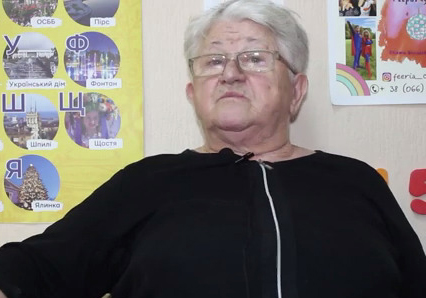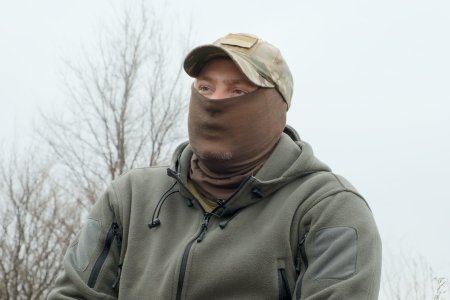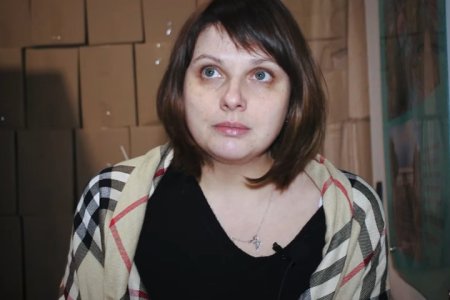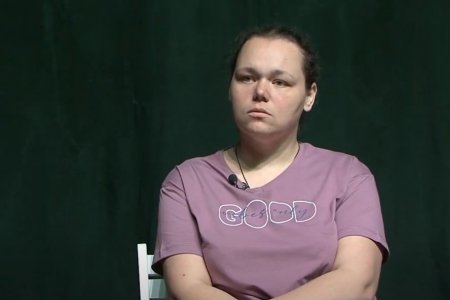We lived very well. We have lived with our children nearby. They were constantly checking on us. We had a wonderful life. We loved Mariupol very much. I was born in Mariupol and have lived there all my life. And now, I want to return to my hometown — Mariupol and meet with all the people I knew with whom I worked and lived. Everything I have is connected with Mariupol.
On the morning of 24 February, we heard loud explosions. We didn’t understand what it was. And then the husband went to where these explosion sounds were coming. He saw that a house had been bombed not far from us, at a distance of two streets. The bomb hit the middle of the house. My husband told me how terrible it was: everything was on fire, and ashes were around. Nearby homes were damaged due to the blast. We couldn’t figure out what it was. Where? How? Who did it? An ambulance came and took people away. They were sleeping and didn’t expect anything like that, but this happened. After that, we learned that shelling was all around. The children have come to us. We were distraught and began to hide in the basement. And all the time, we followed the events that unfolded around us.
Once, my son rushed in: “Dad, dad!” And no one answered. He rushed out, and the daughter-in-law ran after him. She was gone for a long time, and then she returned to the basement and said to her daughter, my granddaughter: “Eva, please give me some kind of belt or something else; I need to bandage it, stop the bleeding.” The granddaughter gave her belt, and the daughter-in-law ran, forbidding us to go upstairs. I realized something happened there and said: “I’ll go and see.” However, the children held my hands, and I started screaming because I realized something had happened to my husband. An hour later, my daughter-in-law returned and reassured me: “Mom, everything is fine, everything is fine, don’t worry.” But I saw that her light tracksuit was covered in blood. She didn’t tell me anything. We sat, waiting, and the daughter-in-law was nervous because shelling was happening everywhere, and leaving the basement was impossible. She was worried about her husband because she knew what had happened with mine. It turned out that she and my son loaded my husband into the Volga [car]. They said there were shellings, and he was thrown from the street towards a neighboring house next to our basement. They started to pull him, but he was a tall, heavy man, almost 90 kg.
The daughter-in-law told me later: “Mom, I believe in God. Because suddenly, out of nowhere, a woman appeared. There was no one on the street as the shelling was intense, but the woman walked with her son, a strong boy of 15-16, and they rushed to help us.”
Tell me, is there no God in the world? The four of them dragged him to the car. We have a corner house, and they had to pull him 50 meters. It was hard, but they dragged him through the neighboring gate, which was bent by the shock wave.
The son bandaged him, provided first aid, and took him to the hospital. Then the son returned and said: “Mom, don’t worry, everything is fine with Dad, he has problems with his legs, but everything is fine. The doctor said I provided first aid promptly and timely and correctly stopped the bleeding. However, they had to cut off his leg and are trying to save the other. They used the Ilizarov apparatus. It should be possible to visit him soon.” When my son returned, we grabbed the necessary documents and other essentials and got into the car. The daughter-in-law said: “There is no room to take anything extra, Mom, don’t take much.” So we raced at speed under constant shelling. This was how we left home.
We let the dog out of the enclosure into the street so that he could find water. Somehow we felt we would no longer return to our home in wartime. However, there was no way to leave Mariupol. Everything was blocked. No corridors. We went to the Drama Theatre, and we wanted to stay there. Then the son said: “No, let’s go to another place.” We started looking for another place to spend the night until there was a corridor and decided to go to Ilyich’s factory. There was an orphanage there. All the children were taken out of it, and they accepted everyone who needed shelter. We decided to stop there. It was a blessing that God saved us, and we did not stay at the Drama Theatre.

We were at the shelter for a long time. There were giant craters from the falling bombs. We saw how people died. There were a lot of us in the shelter—many believers. People were praying. One day a man who was the eldest among us came and said: “Our people, the believers, told me that it would be possible to leave Mariupol. You have 15 minutes to get ready if someone wants to go.” And so we got ready: five cars. We quickly gathered and left half of the things. From the essentials, we took the most necessary. Then, we went and joined the people who were also driving. A column formed, and we managed to arrive in Berdiansk before curfew.
In Berdiansk we stayed with friends. We drove through a wooden bridge, which a truck could not pass, but a passenger car could easily. We used this bridge to visit my husband in the hospital. We saw him on the eighth, and he felt fine. He cried a little, but I calmed him down, saying everything would be fine: “Don’t worry, we will cure one leg and put a prosthesis on the other. We will do everything, and it will be fine. Just hold on and be good."
We left him money, documents and drove off. We returned on the tenth, and I discovered my husband was in the hallway. He underwent an operation and was transferred to traumatology but was placed in the corridor. We were shocked when we arrived. We rushed to him with my daughter-in-law: I took one hand, she took the other, but he was unconscious. Eyes opened barely breathing, blue hands. I don’t know why, but he felt terrible. A woman who worked there as a cleaner said he screamed, and the doctors tied him to the bed. He was lying in Ilizarov’s apparatus with some kind of attached weight.
How it all works, I don’t know. But they bandaged his hands so tied they turned blue. How could it be tied up like that? Probably, there were no personnel, and they did not watch the patients. My daughter-in-law and I untied his hands and started massaging him. We raised a commotion and gathered all the doctors. They did everything necessary for him: droppers, injections, measured his pressure, and a neuropathologist came. Then the doctor who operated on him arrived. Said, “I’m a surgeon; I removed his leg. We did everything right, and everything will be fine.” But later, my son told me: “Mom, they say he will die because he has pulmonary edema.”
We were in Mariupol for ten days, then another ten in Berdiansk. Then, suddenly, my son received a call from a friend from the Dnipro who inquired about his father. My son repied: “There is no dad.” — “What do you mean? Your dad is alive!” As soon as I heard this, I picked up the phone and said: “Oleksiiu, please call your mother and find out.” His mother worked in that hospital. She helped many sick in Mariupol, and we asked her to look after my husband. And he answered: “Yes, he is alive, but okay, I’ll ask.” I begged him: “As soon as possible!” The next day he called: “Your dad is alive. Valentyn Vasylovych is alive.”
Then we learned that they started issuing lists of people who were being evacuated from Mariupol. In them, we found my husband. But there was no evacuation yet. I don’t know where this information came from. But we discovered he was alive and wondered when the evacuation would be. So we called in the morning, and they said, “He is already in Donetsk.” That is, they transported him to Donetsk. They put him in the hospital for treatment. Then he was transferred to the hospital on Semashko Str because it had generators and other facilities. The doctors were afraid and said that they would not operate without it. So finally, they did an operation on Semashko. They cut off the second leg, but he lived briefly there. On the eleventh of May, he died.

During that time, I was in Dnipro. I found a hospital where they make free prostheses. I even told him, “I will take you to the Dnipro. For sure!” I was looking for carriers to go there and pick him up. I have lost such a wonderful person. I don’t understand how this could happen. How did life turn out like this? I live alone in an apartment in Kyiv. I dream all the time that everything will be fine. Ukraine wins, and we will return to Mariupol. Come back home one way or the other.
 The article was prepared by the Kharkiv Human Rights Protection Group with the support of the "
The article was prepared by the Kharkiv Human Rights Protection Group with the support of the "


